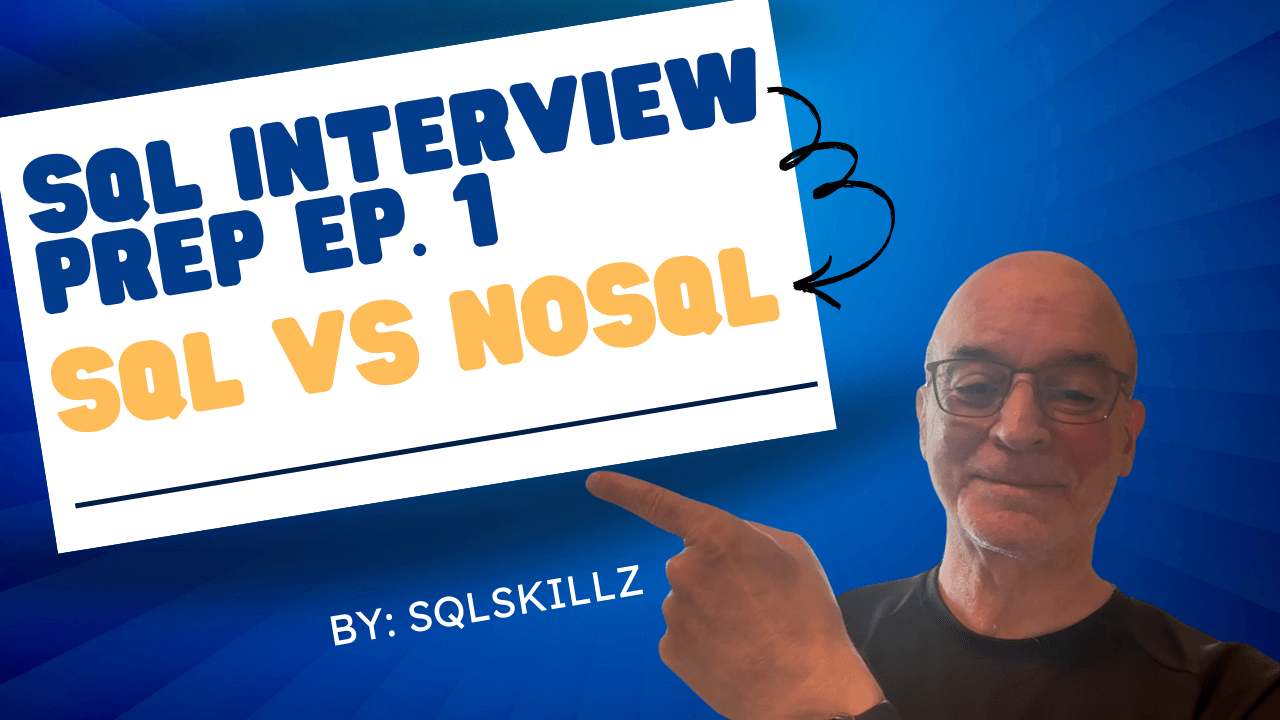A big variety of articles and resources

Learn SQL vs NoSQL - SQL Interview Prep Ep. 1
 Sia Author and Instructor
Learn SQL
Sia Author and Instructor
Learn SQL
4 minute read
Table of Contents
Introduction
Welcome to the first lesson of our "Learn SQL Interview Prep Series: Master Questions & Answers Fast!" In this series, we'll help you prepare for SQL interviews by diving deep into key topics. Today, we're exploring the fundamental differences between SQL and NoSQL databases, a crucial topic for any data-related job interview.
Understanding SQL and NoSQL
SQL databases, also known as relational databases, are designed to manage structured data. They follow a predefined schema, making them ideal for scenarios where data integrity and consistency are paramount. On the other hand, NoSQL databases offer flexibility and scalability, handling unstructured data and accommodating dynamic, rapidly changing information. They're often used in modern web applications and social media platforms.
Advantages of SQL Databases
Data Integrity: SQL databases ensure data accuracy and consistency through constraints, supported by ACID properties (Atomicity, Consistency, Isolation, Durability). This makes them reliable for transactions.
Structured Query Language (SQL): SQL provides a powerful, standardized language for querying and managing data. Its widespread adoption makes it easier for professionals to work with and learn.
Mature Technology: SQL databases have a long history, offering robust security, strong performance, and reliable data management practices. They excel in managing complex data relationships through features like foreign keys and joins.
Advantages of NoSQL Databases
Scalability: NoSQL databases are built for horizontal scalability, making it easy to add more servers as data volumes and user numbers grow.
Flexibility: They can handle a variety of data structures and schema changes without the constraints of a predefined schema, accommodating evolving data models.
Performance: Optimized for speed, NoSQL databases are particularly suited for high-volume read and write operations, often used in real-time applications.
When to Use SQL vs NoSQL
Choosing between SQL and NoSQL depends on your specific needs. Use SQL for structured data, complex queries, and scenarios where data integrity is crucial. NoSQL is the better choice for unstructured data, flexible schema requirements, and when scalability is a primary concern.
Common SQL Interview Questions
Explain the difference between INNER JOIN, LEFT JOIN, and RIGHT JOIN: Be prepared to discuss these SQL joins in terms of the rows they include and their practical applications.
What are the ACID properties and how do they relate to SQL databases? Understanding these principles is key to discussing data consistency and reliability in SQL.
Describe how you would optimize a slow SQL query: This question tests your knowledge of query optimization techniques, such as indexing and join strategies.
Write a SQL query to find the top 10 customers by revenue: Demonstrating your ability to handle complex queries, including sorting and aggregation, is crucial.
Common NoSQL Interview Questions
Explain the different types of NoSQL databases: Be ready to describe document, key-value, graph, and other models, along with their strengths and weaknesses.
Describe the CAP theorem and how it applies to NoSQL databases: Understanding the trade-offs in distributed systems is essential, particularly how NoSQL databases prioritize consistency, availability, and partition tolerance.
How would you design a NoSQL database for a social media application? This question tests your practical application skills in handling user data and scalability.
Explain the concept of eventual consistency in NoSQL databases: Be prepared to discuss how this consistency model works and its implications.
Preparing for a SQL/NoSQL Interview
- Fundamentals: Review the basics of SQL and NoSQL, including their core concepts and differences.
- Practice Queries: Work on writing SQL queries of varying complexity, focusing on joins, aggregations, and subqueries.
- NoSQL Concepts: Understand the key aspects of NoSQL databases, including scalability, flexibility, and consistency models.
- Real-World Scenarios: Think about how you would design databases for various applications, considering data structure and performance needs.
Tips for Answering SQL/NoSQL Interview Questions
- Think Out Loud: Explain your thought process to showcase your problem-solving skills.
- Ask Clarifying Questions: Don’t hesitate to seek clarification to ensure you understand the question fully.
- Write Sample Code: Where applicable, provide code snippets to illustrate your points.
- Stay Calm and Confident: Confidence is key in interviews; preparation will help you stay calm and articulate.
Conclusion
That's it for today's episode on Learn SQL vs NoSQL! We hope this guide helps you navigate the key differences between these database types and prepare for your interviews.
Also, check out our new MasterClass programs on SQL at https://sqlskillz.com/courses for more in-depth learning.
See you in episode 2! Keep learning and good luck with your interview prep!
Related Articles

Mastering Data with an Advanced SQL Online Course
8 minute read

Can I start career as SQL devloper at age of 35 as single?
13 minute read

How to Create a Clustered Index for Better Performance
8 minute read

